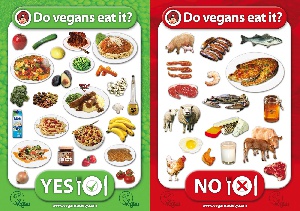“I joke that a big juicy steak is my beauty secret,” said Jolie. “But seriously, I love red meat. I was a vegan for a long time, and it nearly killed me. I found I was not getting enough nutrition.”
This is not an uncommon complaint among former vegans; the limitations of the diet require extra diligence to make sure you get proper nutrients.
Any time you make a comment about vegetarianism/veganism, like actress Angelina Jolie’s recent casual remark, you run the risk of ruffling more than a few feathers says Dr. Mercola.
But her experience was loudly echoed in many of the comments that were posted on the China Study rebuttal. In my research into cancers; I realized that no matter how well one eats or exercised no one is indestructible. I have seen diverse kinds of people with prostate diseases and Vegans are not exempted.
So is the Vegan diet for everyone? I have vegan friends who believe that all to cancer prevention is about dieting and I quit remember in a meeting with one Vegan Doctor Friend in a restaurant when I ordered my diet she was pissed off to see animal protein on my diet. I did laugh also at her. There’s tremendous controversy about what type of diet is best – and whether or not you should ever eat meat and this is why I keep on writing and educating the public on diets so you make your own informed decision and do not quickly jump to one faith because it is working for him or her. We are different being with different needs.
Veganism challenge also:
The energy required to maintain good health is derived from macronutrient food sources – carbohydrates proteins, and fats. Some forms of these foods are more nutritious than others; some, in fact, can contribute to the disease process rather than support the self-healing process. The truth is that vegetarians also have their own issues with health when it comes to diet. For instance, Microorganisms in the colon produce cobalamin, but it is not absorbed here. It is found in meat and milk. Strict vegetarians develop deficiency. Absorption dependent on the production of intrinsic factor in the stomach.
You see, Vegetarians and patients with low levels of stomach hydrochloric acid (from atrophic gastritis, or HCl suppressing medications) are at risk of iron. Iron is a commonly deficient mineral due to inadequate dietary intakes, absorption, and losses through bleeding.
Hemoglobin accounts for 60% to 65% of total-body iron. It will be low in iron deficiency, and is therefore used as an indicator of clinical response to supplemental iron. Ferritin is the storage form of iron in the liver, spleen, and bone marrow. I can go on all day with this.
Sulfur Deficiency is a Commonly Overlooked Pitfall of Avoiding Animal Foods by Vegetarian. Sulfur is derived almost exclusively from animal protein such as fish and high-quality (organic and/or grass-fed/pastured) beef and poultry. Meat and fish are considered "complete" as they contain all the sulfur-containing amino acids you need to produce new protein. Needless to say, those who abstain from animal protein are placing themselves at far greater risk of sulfur deficiency.
Why is this important?
Because sulfur deficiency is pervasive, and may be a contributing factor in:
- Obesity
- Heart disease
- Alzheimer's disease
- Chronic fatigue, and more
In one interview by Dr. Mercola and Dr. Stephanie Seneff, a professor at MIT, overall sulfur appears to be a highly underestimated molecule with vast health implications. It plays a vital role in the structure and biological activity of both proteins and enzymes, and if you don't have sufficient amounts of sulfur in your body, this deficiency can cascade into a number of health problems as it will affect bones, joints, connective tissues, metabolic processes, and more.
Other areas where sulfur plays an important role include:
1. Your body's electron transport system, as part of iron/sulfur proteins in mitochondria, the energy factories of your cells
2. Vitamin-B thiamine (B1) and biotin conversion, which in turn are essential for converting carbohydrates into energy.
3. Synthesizing important metabolic intermediates, such as glutathione
4. Proper insulin function. The insulin molecule consists of two amino acid chains connected to each other by sulfur bridges, without which the insulin cannot perform its biological activity
5. Detoxification
But Angelina jolie stunning revelation on veganism and her ordeal drew my focus to this article.
My Philosophies on Vegetarianism
Let me summarize my position on this issue as it seems I failed to previously communicate it clearly and many Naturopathic Doctors who are vegans thought I was advocating that everyone should eat meat when am known for prostate cancer crusade, which is not at all the case. They believe it is the first area of preventive medicine. I quite remember one even critic me that all he sees is me advocating for early screening of prostate issues and not advocating meat and others disused.
I strongly believe everyone should seek to consume high quality fresh organic and locally grown vegetables every day. The only question is how many, and what type of vegetables. I believe vegetables, and not large amounts of fruits, provide the powerhouse of nutritional benefits that will vastly improve your health.
Even the renowned Dr. Mercola had this to say on his experience with vegetarian diet: As an example of complications of consuming too many fruits, I experimented with following a mostly vegetarian diet after reading the book Fit for Life back in 1985. The book made some very compelling arguments.
However, after a few weeks of eating fruit for breakfast I was stunned to discover my fasting triglycerides had skyrocketed from below 100 to nearly 3,000 (yes that is not a typo)! Clearly this diet was NOT right for me and was rapidly doing some serious damage to my body. I’m thankful I caught my mistake before it was too late.
I stated that if I had continued on that program I would have likely passed away from cardiovascular disease long ago. That does not mean the program does not work for some as I am sure many benefit by using it. However it clearly did not work for me personally, and I believe it could be a disaster for other strong protein types like myself. However I am open to change and I view my life as a giant experiment to see how healthy I can get.
I consumed meat at least once a day and more commonly twice a day. I have decreased my meat consumption over the past year to once or twice a week and replaced most of the meat with wild Alaskan salmon from Vital Choice. All the beef and chicken are organically and humanely raised, not factory farmed.
After reviewing the evidence it seems that raw organic milk is probably one of the healthiest proteins you can consume to promote health as it has many immune benefits and factors that will stimulate muscle growth if exercising properly and insufficient muscle mass is a problem for most people.
Raw milk has the highest biologic value and utilization of any protein. I personally drink over a gallon of raw organic sheep milk every week with my Miracle Whey protein and I believe that and my exercise program are the reason I have been able to reduce my body fat to 10%, gain ten pounds of muscle and lose ten pounds of fat and look like a sprinter now instead of a marathon runner”.. This is Dr. Mercola’s experience. So you see, the fact that you are a vegan doesn’t mean that we should all be vegan or Doctors should propose veganism.
Vegetarianism/Veganism is not right for everyone
Before I proceed, let me stress the importance of individual transformations. It’s dangerous to say that any one diet is right or “best” for everyone and I did wrote on the blood or group diet.
Please understand that I am not at all advocating everyone needs to eat meat and certainly no one should eat factory farmed meat, where the harm may outweigh the benefit for most because of their well-documented problems, which are only worsened when the meat is cooked.
It is my scientific belief that practically everyone benefits from some animal protein. In some cultures this may be very little and might just be the insects consumed in grains as in India. It is clear that meat is not necessary for most carb types, but they would benefit from other animal proteins like raw organic dairy and eggs. These protein sources would not disturb any ethical concerns about forfeiting animals for meats.
According to Dr. Mercola, there are 90,000 individuals in the US that are 100 years or older but none of them are vegetarians. Likewise, I have been to the northern region and have seen aged over 100 years and they know nothing about veganism and some of them are also in some other parts of the country. Meats are revered in the Northern region and the Muslim community yet you see some live over hundred.
When making a decision about which foods to eat, there are a number of factors that need to be considered.. These factors all contribute to people’s confusion about diet, and about whether or not they should eat meat and my article on the Bible and food, how it divides us drew lots of commendations by readers.
Factors to consider with respect to diet according to Dr. Mercola:
Your nutritional type, which determines what ratio of fats, carbohydrates and protein your body needs to thrive.
I believe it’s safe to say we all need some of each of these three categories, but our bodies require different ratios of each. This means that some people will thrive on very large amounts of vegetables and very little animal protein. For others, this ratio would spell disaster for their health.
The quality of the meat, and the way it is cooked will impact its health benefits.
The types and amounts of vegetables chosen, as not all vegetables are suitable for all nutritional types, and different types need more or less vegetables to thrive.
The people who fare the worst on a vegetarian diet are those who are naturally protein types, as they're depriving their bodies of essential fuel, determined by their genetic and biochemical makeup.
Health News of Wednesday, 6 September 2017
Source: dr. raphael nyarkotey obu













